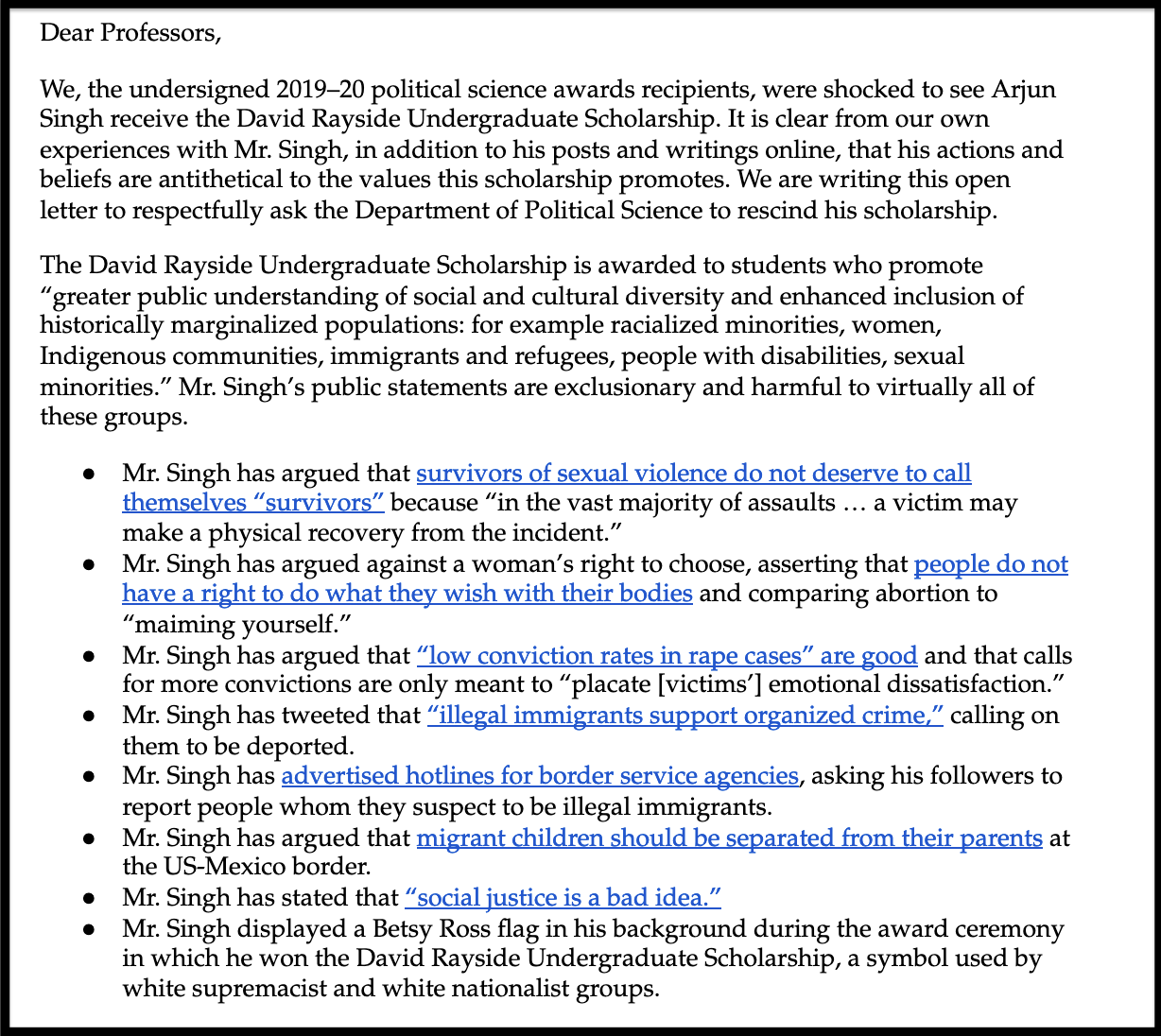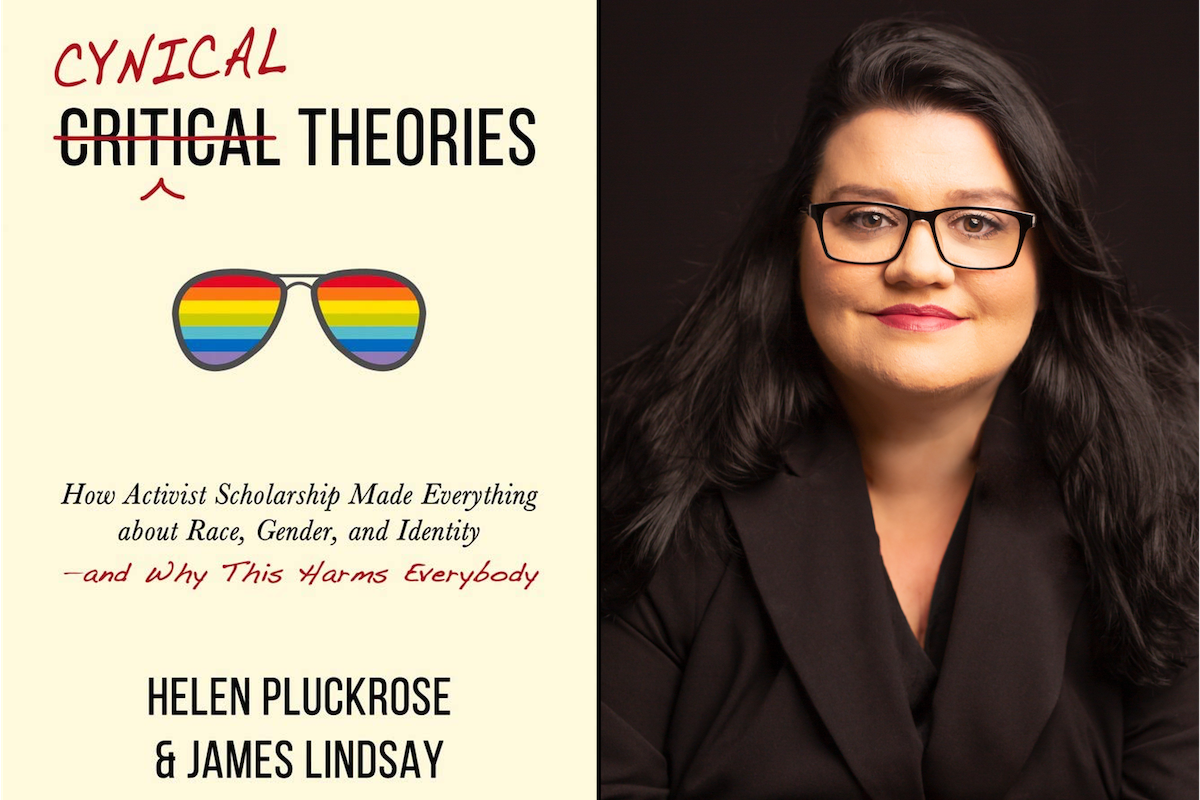Activism
A (Failed) Campaign to Smear a University of Toronto Scholarship Student as a Bigot
The problem, he notes is that there is always going to be a required balance between our trusting inclination of accusations from an apparent victim, and everyone’s inviolable right of due process.

Arjun Singh is an Indian-Canadian student of mixed Sikh and Hindu ancestry, set to finish a four-year undergraduate degree at the University of Toronto in just three years, while reportedly boasting a 3.96 cumulative GPA in his course work with the departments of Political Science, International Relations, and American Studies. His LinkedIn page indicates that he speaks multiple languages and has work experience with the US State Department. So no surprise that this high achiever has earned numerous awards and scholarships.
In recent days, however, 13 fellow students (six of them white, for those who count these things) publicly expressed their claimed “shock” that Singh had received the Political Science department’s $1,000 David Rayside Undergraduate Scholarship, awarded to “students who have demonstrated commitment and leadership in co-curricular activities, on or off campus, promoting greater public understanding of social and cultural diversity and enhanced inclusion of historically marginalized populations: for example racialized minorities, women, Indigenous communities, immigrants and refugees, people with disabilities, sexual minorities. Award is based on academic achievement and financial need.”
On January 31st, the angry students penned an open letter addressed to three professors holding high administrative positions, with the announced aim of having Singh’s scholarship revoked. The letter contains a nine-point list of claims that purport to depict Singh as a bigot. Within a day, both the Arts and Science Student Union and the International Relations Society released statements calling for greater transparency over award selection. Another statement was issued by the Equity Studies Student Union (ESSU), signal-boosting the original anti-Singh manifesto. The ESSU called on the Political Science department to rescind Singh’s scholarship on the basis that “his views are racist, sexist, xenophobic, and deeply harmful to the groups this award claims to support.”

One particularly enraged student, Nashwah Turshin, created a Change.org petition under the title “Remove the David Rayside Scholarship from AS.” (Singh’s name was scrubbed from the petition by Change.org, apparently for legal reasons, as discussed below.) Comments include: “He is the biggest white supremacist at [University of Toronto],” “I hate Incels,” and “He’s a fucking rape apologist racist idiot. Fuck Arjun.”
The petition indicates that Singh’s “views are immensely far-right and he has made numerous public posts belittling sexual assault survivors, women, Muslims, Hispanics, the LGBTQ+ community, and the list goes on.” Nashwah argues that “Having [Singh] win this scholarship, with such a [sic] specific criteria, goes against all of [the] University of Toronto’s diversity stances, their no-tolerance stance for hate speech, and so much more.” It ends with a hunt for personal anecdotes that would help discredit Singh: “If anyone has had experiences with [AS] that were less than desirable, do send an email to the respective undergraduate department chair.” As of this writing, there are more than 4,000 signatures.
So what are the comments that can earn a student this kind of treatment? Is Singh a neo-Nazi? A white supremacist? A hate-addled misogynist? None of those things, in fact—which is what makes this tiny non-scandal worthy of close investigation: It’s a case study in how a student-led mob can mobilize against one of their own, even when their accusations are based entirely on intellectually dishonest forms of character assassination. And of course, universities take these accusations seriously. The University of Toronto’s Political Science department assured students that administrators were “actively looking into this matter” before announcing (to their credit) that they’d “determined that all of the scholarships were awarded in a manner that was consistent with the rules set out in the application process.”
The specific claims against Singh appeared in the open letter as listed below. (These bullet points are direct quotes from the open letter, and all web links appeared in the original posted list as well.)
- Singh has argued that survivors of sexual violence do not deserve to call themselves “survivors” because “in the vast majority of assaults… a victim may make a physical recovery from the incident.”
- Singh has argued against a woman’s right to choose, asserting that people do not have a right to do what they wish with their bodies and comparing abortion to “maiming yourself.”
- Singh has argued that “low conviction rates in rape cases” are good and that calls for more convictions are only meant to “placate [victims’] emotional dissatisfaction.”
- Singh has tweeted that “illegal immigrants support organized crime,” calling on them to be deported.
- Singh has advertised hotlines for border service agencies, asking his followers to report people whom they suspect to be illegal immigrants.
- Singh has argued that migrant children should be separated from their parents at the US-Mexico border.
- Singh has stated that “social justice is a bad idea.”
- Singh displayed a Betsy Ross flag in his background during the award ceremony in which he won the David Rayside Undergraduate Scholarship, a symbol used by white supremacist and white nationalist groups.
- In addition to his social media posts, Mr. Singh frequently and openly expresses racist and sexist beliefs in many of our political science classes, hindering greater inclusion in the department and hurting students from marginalized communities that this award intends to advocate for.
Let us now examine these claims one by one.
Singh has argued that survivors of sexual violence do not deserve to call themselves “survivors.”
Embedded as a hyperlink is a blog post that Singh wrote in 2018, titled Believing Survivors. In it, he writes, “for liberal democracies, which in theory view all as equal (gender being no exception), there is no question [the #MeToo] movement is overdue. Abuses of power—first to assault, then to conceal—have impacted victims in ways that are difficult to quantify. These victims undoubtedly deserve their day in court and the closure it brings.”
The problem, he notes is that there is always going to be a required balance between our trusting inclination of accusations from an apparent victim, and everyone’s inviolable right of due process. As others have noted, the slogan “believe survivors” implicitly suggests that no such due process is owed to the accused—as does the baseline presumption that they have “survived” an as-yet-unproven crime. “Before anything else,” he writes, “it is necessary to make a correction in terminology—from ‘survivors’ to ‘accusers.’ While this may appear pedantic or even insensitive, it does not intend to be.” He goes on:
Firstly, from a logical perspective, sexual assault per se is not a crime that always threatens the mortality of a victim. With the exception of extreme cases such as body mutilation or violent rape, it is—in the vast majority of assaults—possible that a victim may make a physical recovery from the incident. Secondly, and more importantly, the term ‘survivor’ presumes that the individual levelling allegations is actually telling the truth—when this is the very question that must be investigated. While I agree that accusers mustn’t be silenced, ought to be respected and given a fair hearing; it is disingenuous (in criminal cases) to give people carte blanche… which leads to non-objective & biased consideration of the actual case.

Nowhere does Singh say anything like “survivors of sexual violence do not deserve to call themselves ‘survivors,’” since the term “deserve” implies a moral judgment. His argument here isn’t about moral status. He merely argues that there is more useful and legally accurate language we should be using. You may agree, or disagree. But the suggestion that he is a rape apologist sneeringly demeaning victims is absurd.
“Singh has argued against a woman’s right to choose, asserting that people do not have a right to do what they wish with their bodies and comparing abortion to ‘maiming yourself.’”
The subtext here is that campus cancel mobs now regard pro-life views as tantamount to hate speech. That kind of ideological intolerance is objectionable in and of itself. But it’s especially appalling when it’s packaged in this kind of intellectually dishonest accusation. What Singh actually wrote was:
Pro-choice activists often claim that people, “have a right to do what they want with their bodies.” That’s ridiculous and untrue. Nobody has had the unrestricted right to do as they pleased with their bodies. If you try maiming yourself, you’ll be sent to a sanitorium. This agency is further restricted when one’s actions can affect other living beings.
The language here is impolitic, and out of fashion with progressive ideas. But it’s notable that Singh wasn’t even arguing against a woman’s right to have an abortion (not that such an argument should be considered beyond the pale, even if he’d made it), but rather was objecting to the pre-supposed underlying principle that we all have complete private autonomy. In the introductory bio-ethics course at the University of Toronto (the one I took when I attended the university, at any rate) personal autonomy is only one factor cited in the general class discussion we had on the issue of abortion.
As with the first bullet point, the pattern here is that Singh actually wants to debate the issues, and believes that, in doing so, accurate language and honest discussion of first principles should trump vague sloganeering. His critics, sadly, disagree.
“Mr. Singh has argued that ‘low conviction rates in rape cases’ are good and that calls for more convictions are only meant to ‘placate [victims’] emotional dissatisfaction.’”
Once again, one clicks to the actual source material, and the truth betrays the dishonest nature of the accusation:
Some feminists claim that a “low conviction rate in rape cases” is a bad thing. Really? The justice system is designed to be fair to both parties—with a rigorous consideration of evidence and adherence to law. If they weren’t convicted, they aren’t guilty. We cannot simply send people to jail unfairly to validate and placate emotional dissatisfaction.
Again, Singh is merely articulating a baseline principle of due process. Under our system, everyone gets their day in court, and we don’t convict people to make this or that constituency feel good. If an obvious sexual abuser goes free because a judge or jury gets a case wrong, that’s a reason to consider reforms. But in general, there is no such thing as a “good” or “bad” conviction rate for any particular class of crimes—except, one might argue, insofar as it indicates, on average, the strength of the cases being brought to court by prosecutors.
By now, readers can see the pattern of intellectual dishonesty and smearing at play, and there is no need to go through the other claims against Singh in the same detailed way—though some brief discussion is warranted.
Purported evidence of xenophobia
The evidence in regard to accusations (4), (5), and (6) purport to demonstrate Singh’s alleged racism and xenophobia. But the links merely take you to tweets in which Singh has: (a) claimed that illegal immigrants, having few opportunities for over-the-table-work, tend to be preyed upon in the grey- or black-market economy, and so become victimized by organized crime; (b) repeated the toll-free illegal-immigrant phone number at the Canadian Border Service Agency (which, to my knowledge, marks the first time that the repetition of a publicly available government phone number has been classified as hate speech); and (c) noted that when criminals go to jail, they can’t take their children with them, and so it isn’t clear why this separation is immoral in one illegal context (border crossing) but not another (every other form of illegal activity that results in detention).
That last statement really does seem insensitive in tone, but he’s not wrong that this logical tension does exist. Moreover, his point is theoretical—as most of his arguments tend to be—and nowhere does he champion the truly abusive and draconian border measures that the Trump administration imposed.
Purported evidence of anti-social-justice wrongthink
The seventh claim against Singh is based on the fact that he once tweeted “social justice is a bad idea”—which would be an odd thing to say if one presumed he were talking about actual social justice, as opposed to “social justice” in its idiomatic and ideological sense—i.e., a doctrinaire and, at its extreme edges, cultish set of dogmas that often achieve the opposite of their intended purpose. If criticism of that is off limits, then most people in society would apparently be ineligible for the David Rayside Undergraduate Scholarship.
Enter Betsy Ross
In bullet point eight, we learn that “Mr. Singh displayed a Betsy Ross flag in his background during the award ceremony in which he won the David Rayside Undergraduate Scholarship, a symbol used by white supremacist and white nationalist groups.” On this point, there is no accompanying reference or screenshot. But even assuming the story is true, it is only recently that this historical curiosity has been used as a racist symbol. Moreover, Singh isn’t white, which would make him a very odd candidate for a white-supremacist movement.
We simply don’t like the guy
In the final bullet point, we are told that Singh “frequently and openly expresses racist and sexist beliefs in many of our political science classes, hindering greater inclusion in the department and hurting students from marginalized communities that this award intends to advocate for.” No evidence is cited. We are simply left to believe that the authors and signatories can be trusted to honestly characterize the nature of Singh’s classroom contribution—whereas all of the previously listed misinformation indicates that the opposite is true. If the open-letter signatories have a recording of Singh marching around a classroom quoting from Mein Kampf, let’s see it. But if it’s just another ingredient in the stew of torqued quotes that appear elsewhere, this final point need not detain us.
* * *
Putting aside the line-by-line parsing of Singh’s views, there’s a larger reason I’m inclined to give him the benefit of the doubt, one rooted in my appreciation for what is now sometimes called neurodiversity.
I used to be a teacher at a high school in Toronto called The Study Academy. It’s a place where many students are “double-exceptional,” meaning they are gifted and yet simultaneously have a learning disability. Some are on the autism spectrum. I would hear stories from these students who’d struggled at their previous school, often because they were more intellectually advanced than their peers, but for developmental reasons lacked the ability to phrase their thoughts in a trendy way. “Neurotypical” bullies would berate them for being contrarian and rude, and ostracise them publicly. (The founder and principal of the school, Bryan-Levy Young, told me “We see it often.”) In an age of social justice, apparently, some of those bullies grow up to be cancel-culture mob leaders such as Nashwah Turshin.
Before U of T (as the university is commonly known) announced that Singh would keep his scholarship, I called retired U of T professor David Rayside to ask if he’d comment on the situation, since his name is on the scholarship. He told me, “I usually give comments to reporters, but not in this case.” When pushed a little more, he insisted he would give “no comment,” and that, “All I can say is that I have faith in my department to make the right decision.” As it turned out, the department made the right decision.
But even though Singh keeps his scholarship, his detractors haven’t completely lost. They’ve made the exercise of free speech costlier by showing everyone what can happen to you if you step out of line ideologically. And without suffering any penalty for their misleading claims, Nashwah and other mob leaders can continue targeting people.
I also learned that Singh’s lawyer sent a libel notice to Change.org—which explains why his name was purged from the main display elements of the page. His lawyer also sent a letter to U of T, pointing out “that a good education does not equate to an automaton sprouting Marxist dogma.” It’s a fine line, but I’d say it’s wrong to blame Marx for this. Reading Marx is difficult, and most of these students can’t seem to honestly paraphrase a six-word tweet.
Nietzsche identified this stereotype in the late 19th century, pinning such specimens as “tarantulas.” “Preachers of equality,” he said, were often motivated by a sinister impulse, often revealed in anger. Speaking as Zarathustra, Nietzsche expounded in parable, “Therefore do I tear at your web, that your rage may lure you out of your den of lies, and that your revenge may leap forth from behind your word ‘justice.’”
Among cancel-culture mobs, “justice” becomes a righteous veneer for envy, and even sadism. Maybe we don’t need to read Nietzsche, or even best-selling free-speech warriors like Jordan Peterson, to understand what’s going on here. These are petty playground children who haven’t grown up. And if there were a scholarship for those demonstrating infantilism, the competition would be fierce.






